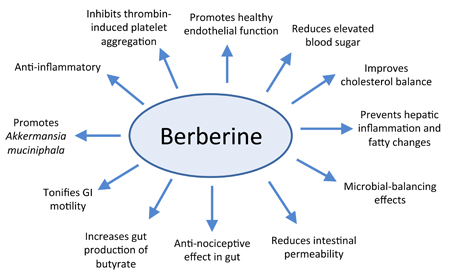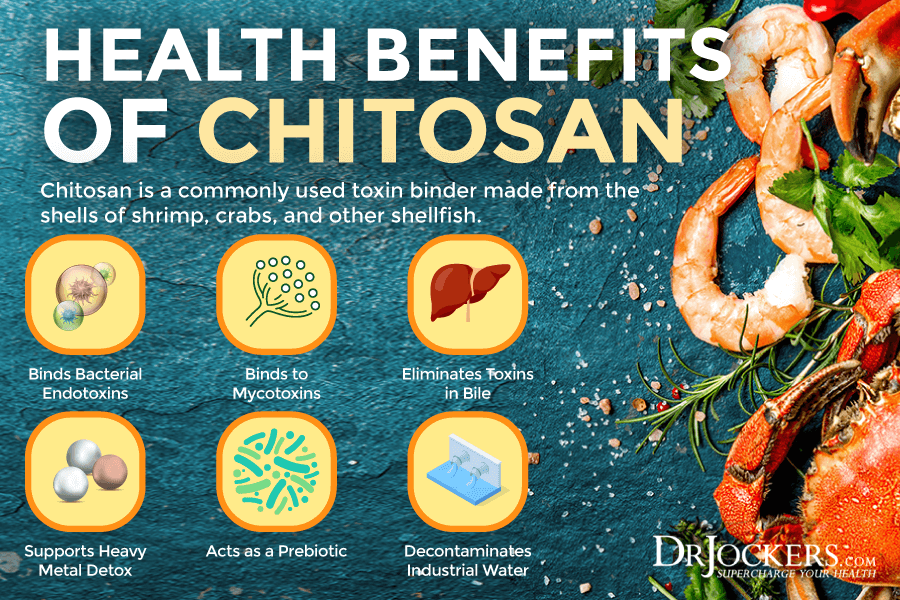
In recent posts, this author has covered red yeast rice (RYR) and its beneficial effects upon dyslipidemia and clinical outcomes. Additional posts began exploring RYR with coenzyme Q10 (CoQ10) to counteract potential CoQ10-lowering effects of RYR. In the following sections, research will be provided which considers the potential synergistic and lipid-lowering effects of concurrent supplementation of RYR with berberine and chitosan.

Berberine is a substance extracted from many plants found within the Berberidaceae family as well as other plant species to include Phellodendron amurense, Coptis japonica, Argenome mexicana, Thalictrum flavum, Hydrastis canadensis, and Coptis chinensis.1 Berberine has been traditionally used in both Chinese and Indian medicine for its antimicrobial properties and effects upon protozoa, fungi, viruses, and bacteria.1(102) However, Bertuccioli et al1(102) indicated that berberine can also exert beneficial effects upon hyperlipidemia; berberine is thought to inhibit total cholesterol (TC) and low-density lipoproteins (LDL-C) levels as much as 30% and 25%, respectively. Such decreases are thought to occur by berberine’s ability to down-regulate the absorption of cholesterol while increasing its excretion.1(102) Such effects suggests that berberine could be used as an adjunct, or replacement, to traditional statins. Having considered berberine and its effects upon hyperlipidemia, the following will explore chitosan and its potential benefits upon the same.

Chitosan is derived from dietary fibers found in fungal cell walls as well as exoskeletons such as shrimp, crab, and lobster.2 Chitosan is thought to induce its lipid-lowering effects at the gastrointestinal level; chitosan has been found to swell into a gel with a strong affinity towards negatively-charged molecules such as those found in bile acids.2(2) Finally, chitosan tends to interfere with the emulsification of lipids such as triglycerides (TGs) and cholesterol through hydrophobic bonds. Such has also been supported via human and animal studies where diets were supplemented with said polymer; chitosan helped reduce bodyweight and lower blood lipids in trials.2(2) Considering that traditional medical interventions, such as statins, tend to be associated with cognitive dysfunction, gastrointestinal disturbances, neuropathy, muscle weakness, myalgia (muscle pain), and nutrient deficiencies such as vitamin A, D, E, K, and CoQ10, lipid-lowering alternatives have become more appealing.2(1) As such, the following will explore the synergistic effects of combining RYR with berberine and chitosan and its influence upon cardiovascular disease markers.

Spigoni et al3 conducted a randomized, double blind, placebo-controlled study whereby 39 participants (average age 52 years with 52% females) were recruited to explore the effects of a nutraceutical intervention combining RYR, berberine, and chitosan upon non-HDL cholesterol, LDL-C, and apolipoprotein B (APOB). The formulation consisted of 200 mg berberine, 3 mg monacolin K, and 10 mg chitosan.3(1) Once participants were randomized to the experimental group and placebo group, the experimental group received the RYR/berberine/chitosan nutraceutical compound on a once-per-day basis, while the control group received a placebo.3(2) After the trial period (12 weeks), the experimental group experienced a significant reduction in non-HDL-C relative to the control group as well as when compared to the experimental group’s baseline measures.3(4) Furthermore, there was a significant reduction in LDL-C and APOB within the nutraceutical group when compared to the placebo group.3(4-5) Such evidence suggests that said nutraceutical combination could be an effective lipid-lowering alternative to statins.
In conclusion, dyslipidemia is a condition that, left unchecked, could lead to increased cardiovascular risk. However, evidence suggests that natural plant-derived substances such as RYR, berberine, and chitosan can individually attenuate lipid levels through various mechanisms. Ultimately, the research by Spigoni et al3(11) not only supported plausible alternatives to statins via the lipid-lowering of RYR, berberine, and chitosan; said study also served as a reminder that many nutrients work best when provided in concert with other nutrients and foods.
References
1. Bertuccioli A, Moricoli S, Amatori S, et al. Berberine and dyslipidemia: Different applications and biopharmaceutical formulations without statin-like molecules – A meta-analysis. J Med Food. 2020;23(2):101-113. doi:10.1089/jmf.2019.0088.
2. Huang H, Zou Y, Chi H, et al. Lipid-modifying effects of chitosan supplementation in humans: A pooled analysis with trial sequential analysis. Mol Nutr Food Res. 2018;62(8):1-10. doi:10.1002/mnfr.201700842.
3. Spigoni V, Aldigeri R, Antonini M, et al. Effects of a new nutraceutical formulation (berberine, red yeast rice and chitosan) on non-HDL cholesterol levels in individuals with dyslipidemia: Results from a randomized, double blind, placebo-controlled study. Int J Mol Sci. 2017;18(1498):1-15. doi:10.3390/ijms18071498.
-Michael McIsaac
